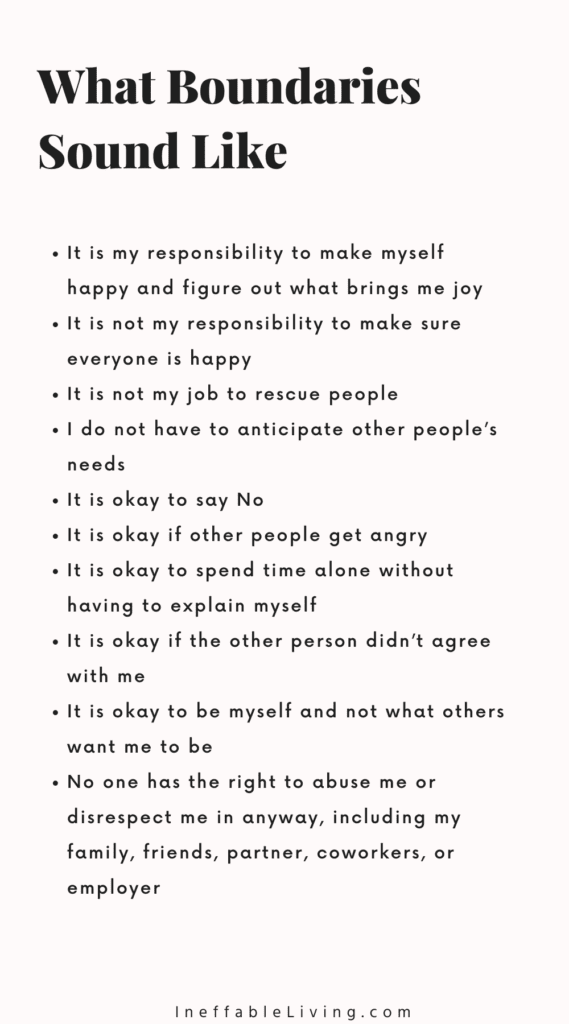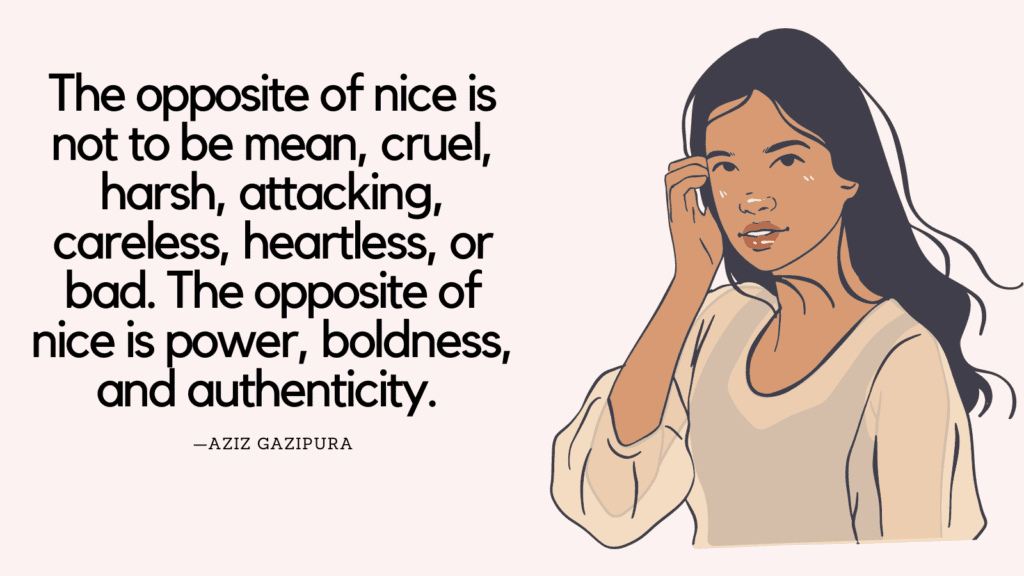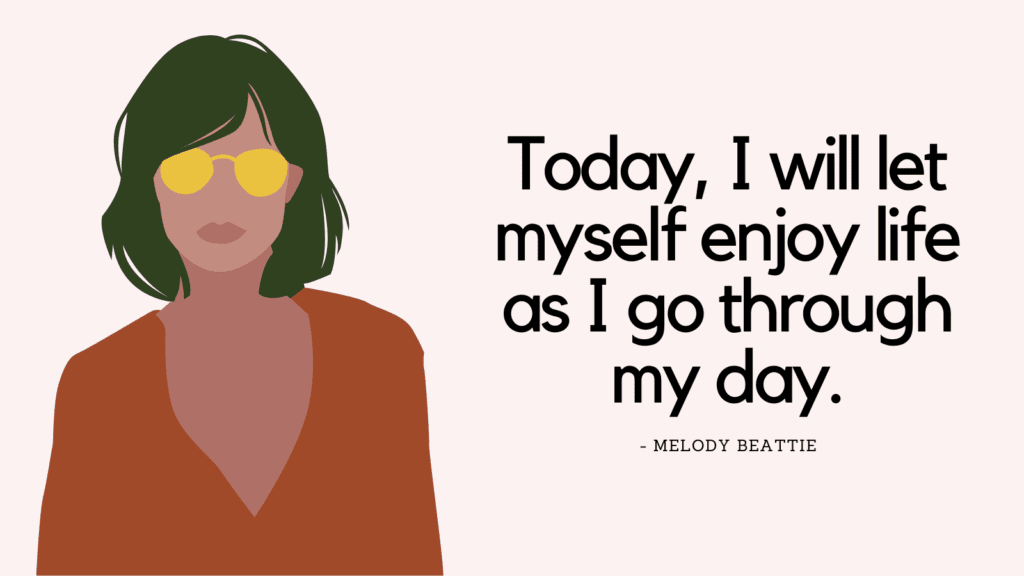This post contains some of the best advocate for yourself quotes.
Advocate For Yourself Quotes
1. “Breaking free from the Nice Guy Syndrome involves taking responsibility for one’s own needs. Others may cooperate with the Nice Guy, but they are not in charge of meeting his needs. By making their needs a priority and putting themselves first, recovering Nice Guys can come to see the world as a place of abundance. They can truly come to believe that their needs are important and there are people out there who are happy and willing to help them meet them.”—Robert A. Glover
2. “You’re no longer certain that it’s OK to not be nice. Your nice person programming sneakily regains control and you fall back into the cage, more unsure of yourself than ever. But if you can stick with it, and work through the discomfort of the backlash, this is the way out. This is your path to power, peace, confidence, and freedom. This is your path to reclaim yourself–the real you–who has been lost under layers of niceness, fear, and messages about who you “should” be.”—Aziz Gazipura
Related: Top 25 Tips On How To Set Boundaries In A Toxic Relationship? (+FREE Worksheets PDF)
3. “Nice Guys are wimps. This may not sound like a nice thing to say, but it’s true. Nice Guys tend to be wimpy victims because their life paradigm and childhood survival mechanisms require them to sacrifice their personal power.”—Robert A. Glover
4. “The goal of teaching Nice Guys to embrace their feelings is not to make them soft and “touchy-feely.” Men who are in touch with their feelings are powerful, assertive, and energized. Contrary to what many Nice Guys believe, they don’t have to become more like women in order to have their feelings. This is why I support men in learning about their feelings from other men.”—Robert A. Glover
Related: Healthy Boundaries Quiz (+Free Pdf Worksheets)
5. “The opposite of nice is not to be mean, cruel, harsh, attacking, careless, heartless, or bad. The opposite of nice is power, boldness, and authenticity. Power is your ability to choose your direction, action, and destiny. It’s your ability to feel equal to those around you, rather than inferior. It’s your ability to stand tall, look people in the eye and be powerful on this planet–a force for good, a force to be reckoned with.”—Aziz Gazipura
6. “Surrender allows recovering Nice Guys to let go and respond to life’s complex beauty, rather than trying to control it. Surrender allows these men to see life as a laboratory for learning, growth, and creativity. Surrender allows recovering Nice Guys to see each life experience as a “gift” from the universe to stimulate growth, healing and learning. Instead of asking, “Why is this happening to me?” the recovering Nice Guy can respond to life’s challenges by pondering, “What do I need to learn from this situation?””—Robert A. Glover
7. “There is a solution to the helplessness and vulnerability Nice Guys feel. Recovery from the Nice Guy Syndrome allows Nice Guys to embrace the personal power that is their birthright.”—Robert A. Glover
Related: What Do Boundaries Sound Like? + 35 Boundaries Examples
8. “Authenticity is your ability to be you. It’s funny that we must cultivate this ability. And yet with all our nice-person training and other conditioning, it seems to be so. Authenticity is your ability to look inward and know who you are–what you perceive, what you think, what you feel, what you want, and what you believe. It’s your ability to honor and respect all you see, to love what you see, so that you may boldly bring it forth and share yourself with the world.”—Aziz Gazipura
9. “Part of having solid boundaries, and being less of a nice person involves owning your perspective. Valuing it, acknowledging it, and being willing and able to share it. It doesn’t matter if someone in the company has been there longer than you, or that person has read more articles on the subject than you. That doesn’t mean you don’t have insight, ideas, or a unique and valuable perspective.”—Aziz Gazipura

10. “It’s time to interrupt any nice-person habits that keep you from owning your perspective. Stop hypnotizing yourself with the story that you don’t know enough about the subject, or that other people are smarter and you should just agree with them and keep silent. Uncovering what you think about a situation is the first step in being able to assert yourself.”—Aziz Gazipura
Related: Nice Guy Syndrome Test (+Best 19 Practical Strategies To Overcome The Nice Guy Syndrome)
11. “I am going to make a bold, simple claim here that might seem extreme or absolute. In fact, it might go against every nice-person bone in your body. You might challenge it, or have lots of questions about it. And that’s all OK. Ready? You are not responsible for other people’s feelings.”—Aziz Gazipura
12. “One of the biggest challenges most nice people face is the intense internal pressure to be a nice person. Our Superegos have completely taken over and our sense of self, our identity, is that we are a nice guy or a nice girl. To even consider that we might not really be as nice as we think, or to have a desire to be less nice is morally unacceptable and it’s offensive to even consider it. This is why many people become defensive and upset when you question the idea of being nice. It threatens the very core of their personality and how they’ve organized their entire lives.”—Aziz Gazipura
13. “In order to free ourselves of excessive guilt, fear of others’ judgments, and other confining nice person struggles, we must become familiar with our own shadow. We must stop the denial and the pretense that we are just the sweet, not the sour, just the peaceful and never the pissed. When we deny and hide the truth from others, we feel like an imposter, a fraud, and have a deep fear of being discovered for “who we really are.” The more we hide the truth from ourselves, the more guilty, anxious, and even physically injured we become.”—Aziz Gazipura
Related: People Pleaser Quiz (+Top 21 Proven Ways to Stop People Pleasing)
14. “Most nice people I know are carrying heavy backpacks of guilt on their shoulders that they add to frequently. They are constantly feeling bad about themselves, responsible for others, and losing the battle against the inner voice that tells them they’re a bad person. Much of this guilt comes from being identified with the Superego and thinking that anything that comes from your Id is bad. Guilt is the Superego’s primary weapon against the Id. When you release the battle with your shadow, you will release your guilt, and your sense of happiness and joy will magnify dramatically.”—Aziz Gazipura

15. “If we’re living in a world where we think we should be pleasing and nice, we should take on responsibility for the feelings of others, we should only feel loving and never angry, then we’re lost before we begin. We’ll never be able to speak up. Because doing so will break our internal rules and leave us feeling anxious, guilty, and ashamed. We’ll feel like a bad person who is unworthy of love and belonging, which is a pretty intense form of pain. And so, despite our desires to be bold, get results, be authentic, have great relationships, and create the life we want, we won’t speak up and go after what we want.”—Aziz Gazipura
16. “The key to being less nice around your boss, senior management, and anyone else is to see through the company strata and look right at the person in front of you. The human being. The soft, fleshy pile of bones, organs, and skin. The one who has hopes, dreams, and fears, just like you.”—Aziz Gazipura
17. “You are not going to be stopped. You decide you’re not going to be nice. You face your fear and speak up, or say no, or put yourself first for once. Success! Right? Sure, but it doesn’t feel that way.”—Aziz Gazipura
Related: Take The Echoist Quiz (The Opposite Of A Narcissist)
18. “To liberate yourself from niceness and unleash your boldness and power, you do need to recondition and train yourself. You have countless unconscious, habitual responses to situations that might cause you to respond with niceness, submissiveness, guilt, approval-seeking, and conflict-avoidance before you are even aware you’re doing it. That’s why we highlighted all the core features of niceness in the first part of this book, so you can become better at catching when you flip back into nice mode. Then you choose differently, again and again.”—Aziz Gazipura
19. “You can actually give more joyously, connect more easily, and love much more fully. Not only that, but shedding your excessive niceness and being more authentic actually brings out the best in others as well. It frees them up to be more genuine, encourages them to advocate for their needs, and treats them like the powerful creators they are in their lives. It creates clearer communications, more productive meetings, and better resolutions for conflicts and disagreements. You being less nice truly does make the world a better place.”—Aziz Gazipura
20. “ In fact, take a few minutes to write out a list of all the ways that being too nice is holding you back in your life. What is it costing you? What has it caused you to miss? What pain does it force you to live in on a daily basis? Then consider the flip side. Write out what it would be like to be free of all this. What would your life be like if you weren’t afraid of other’s opinions? What if you could freely be yourself without worry about what they would think? What if you could say no when you needed to without guilt or fear? What if you could ask for what you wanted, and receive it much of the time? What if you could handle confrontations with calm and bold assertion? How would all this feel? What would this powerful version of you be able to create in your life? What kind of relationships, business, or personal success could it bring? ”—Aziz Gazipura
21. “Breaking out of years of nice person conditioning isn’t a one-step instantaneous process. It isn’t an easy quick fix that involves no discomfort or effort. It isn’t a machine that shocks your stomach muscles while you sit on the couch watching TV until you have rock hard six-pack abs. Instead, it’s a process. It’s a process that can transform your self-esteem, relationships, and life, but it requires commitment.”—Aziz Gazipura
Related: How To Set Boundaries With Narcissistic Parents?

How to Advocate for Yourself?
Advocating for yourself is an important skill that can help you assert your needs, protect your rights, and improve your overall well-being. Here are some scientifically supported strategies to help you advocate for yourself effectively:
1. Clarify your needs
Take time to identify and clarify what you need or want in a specific situation.
Be specific about your goals and what you hope to achieve through self-advocacy.
2. Educate yourself
Gather information and knowledge about your rights, the topic at hand, or any relevant laws or policies.
The more informed you are, the better equipped you’ll be to make a strong case for yourself.
Related: Personal Bill of Rights (+PDF Download)
3. Assertive communication
Practice assertive communication skills to express your thoughts, feelings, and needs confidently and respectfully.
Use “I” statements to convey your perspective and be clear about what you want or expect.
4. Build self-confidence
Work on building your self-confidence and self-esteem.
Recognize your strengths and achievements, and remind yourself of your worth.
When you believe in yourself, it becomes easier to stand up for your rights.
Related: How Confident Am I Quiz (+Best 13 Practical Tools To Feel More Confident)
5. Seek support
Reach out to trusted friends, family members, or mentors who can provide guidance, offer encouragement, or even accompany you during important discussions or negotiations.
Their support can bolster your confidence and validate your concerns.
6. Practice active listening
During conversations or meetings where you are advocating for yourself, practice active listening.
Pay attention to the other person’s perspective, ask questions, and show that you respect their point of view.
This can help foster better understanding and cooperation.
Conclusion
Advocating for yourself is a skill that can be developed over time.
Practice these strategies and be persistent in asserting your needs and rights.



